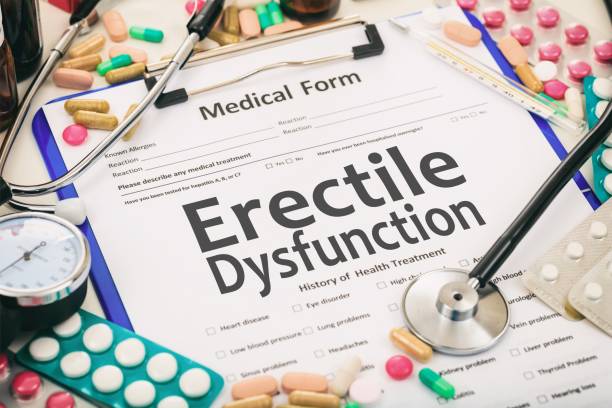Erectile dysfunction (ED) can be a frustrating and emotionally challenging condition, often leading to feelings of embarrassment, stress, and even isolation. However, it’s important to remember that ED is a common issue that affects millions of men worldwide, and it does not have to define your life or relationships. With the right approach, including lifestyle changes, medical treatments, and emotional support, you can take control of your sexual health, boost your confidence, and improve your overall well-being.
In this comprehensive guide, we’ll break down what ED is, explore the most common causes—ranging from physical health conditions to psychological factors—and provide practical solutions to help you overcome it. Whether you’re looking for natural remedies, medical treatments, or strategies to rebuild confidence in the bedroom, this article will give you the tools you need to take back control of your sexual health.
Understanding Erectile Dysfunction
Erectile dysfunction (ED) is the persistent inability to achieve or maintain an erection firm enough for satisfying sexual activity. While occasional difficulties with erections are normal, frequent or ongoing ED can be a sign of an underlying health issue. This condition is more common than many people realize, affecting millions of men worldwide. Although the likelihood of experiencing ED increases with age, it is not an unavoidable part of aging.
In many cases, ED is linked to physical health conditions, lifestyle factors, or psychological stressors—all of which can be managed or treated. By understanding the causes of ED and exploring effective treatment options, men can take proactive steps to regain their confidence and improve their sexual health.
Causes of ED
ED can happen for several reasons, including:
- Physical Health Issues – Conditions like heart disease, high blood pressure, diabetes, and obesity can restrict blood flow, making erections difficult.
- Hormonal Imbalances – Low testosterone levels or thyroid problems may contribute to ED.
- Mental Health Factors – Stress, anxiety, depression, and relationship issues can interfere with sexual performance.
- Lifestyle Choices – Smoking, excessive alcohol use, lack of exercise, and poor diet can all lead to ED.
- Medication Side Effects – Some drugs for blood pressure, depression, and other conditions can cause ED as a side effect.
The good news? Most cases of ED can be treated or improved with simple changes.

Regaining Confidence and Sexual Health
ED can take a toll on self-esteem and relationships. But there are ways to reclaim both your confidence and your sexual function.
1. Improve Your Physical Health
Your overall health plays a crucial role in sexual performance and erectile function. Many cases of erectile dysfunction (ED) are linked to poor circulation, hormonal imbalances, and lifestyle habits that negatively affect the body. By making healthier choices, you can naturally enhance blood flow, increase testosterone levels, and improve your overall well-being—all of which contribute to stronger, more consistent erections.
Here’s how to optimize your physical health for better sexual function:
- Exercise Regularly – Engaging in regular physical activity improves cardiovascular health, which is essential for proper blood flow to the penis. Aerobic exercises like walking, swimming, and cycling help keep arteries clear, while strength training can naturally boost testosterone levels, supporting better sexual performance.
- Eat a Nutrient-Dense Diet – The foods you eat directly impact blood circulation and hormone levels. A diet rich in whole foods—such as fruits, vegetables, lean proteins, and healthy fats—supports overall health. The Mediterranean diet, known for its heart-healthy benefits, has been linked to improved erectile function due to its emphasis on antioxidant-rich foods and healthy fats.
- Maintain a Healthy Weight – Carrying excess weight, especially around the midsection, can lead to insulin resistance, inflammation, and reduced testosterone levels—all of which contribute to ED. Maintaining a balanced weight can improve hormone levels and circulation, helping to restore sexual function.
- Quit Smoking – Smoking damages blood vessels, reducing blood flow and making it more difficult to achieve and maintain an erection. Studies show that quitting smoking can lead to significant improvements in erectile function over time.
- Limit Alcohol and Avoid Recreational Drugs – Excessive alcohol consumption and drug use can interfere with nerve signals, lower testosterone levels, and impair sexual performance. Moderation is key—reducing alcohol intake and avoiding drugs can help restore natural sexual function.
Making these lifestyle changes not only enhances sexual performance but also improves overall health, energy levels, and confidence. By prioritizing your well-being, you create a strong foundation for better intimacy and long-term sexual satisfaction.
2. Manage Stress and Mental Health
Your mental health plays a crucial role in your sexual well-being. Anxiety, depression, stress, and performance pressure can all contribute to erectile dysfunction (ED), making it difficult to relax and enjoy intimacy. When the mind is overwhelmed, the body often follows, leading to difficulties in achieving or maintaining an erection. Fortunately, managing stress and prioritizing mental well-being can lead to significant improvements in sexual performance and overall confidence.
Here are effective ways to support your mental health and reduce stress-related ED:
- Practice Relaxation Techniques – Chronic stress increases cortisol levels, which can interfere with testosterone production and blood circulation. Engaging in stress-reducing activities like meditation, deep breathing exercises, and yoga can help you stay calm, improve focus, and promote overall well-being. These techniques also enhance blood flow, making it easier to achieve and maintain an erection.
- Talk to a Therapist or Counselor – Mental health challenges, including anxiety, depression, and past negative experiences, can impact your confidence and sexual performance. A licensed therapist can help you identify and address underlying concerns, develop coping strategies, and improve your overall mindset. Cognitive-behavioral therapy (CBT), in particular, has been proven effective in treating performance anxiety and ED-related stress.
- Improve Communication with Your Partner – Open and honest communication is essential for a healthy sexual relationship. Many men feel pressured to “perform” perfectly, which can create anxiety and worsen ED. Discussing your feelings, fears, and concerns with your partner can help alleviate pressure, strengthen emotional bonds, and create a supportive, stress-free environment for intimacy.
- Prioritize Self-Care and Mental Wellness – Engaging in activities that bring you joy, whether it’s exercising, pursuing hobbies, or spending time with loved ones, can help reduce stress and improve your overall mood. When you feel good mentally and emotionally, your body responds positively, leading to better sexual health.
By addressing stress and mental health concerns, you can break the cycle of anxiety-related ED and regain confidence in the bedroom. Taking proactive steps to manage your well-being will not only improve your sex life but also enhance your overall happiness and quality of life.

3. Consider Medical Treatment Options
If lifestyle changes alone do not fully resolve erectile dysfunction (ED), medical treatments can provide effective solutions. Many men find success with prescription medications, hormone therapy, or medical devices designed to improve erectile function. Consulting with a healthcare professional is essential to determine the best approach based on your specific needs and health condition.
Here are some of the most common medical treatments for ED:
- Medications for ED – Oral medications known as PDE5 inhibitors are among the most widely used and effective treatments for ED. These include:
- Sildenafil (Viagra) – Works within 30–60 minutes and lasts about 4–6 hours.
- Tadalafil (Cialis) – Can last up to 36 hours, allowing for more spontaneity.
- Vardenafil (Levitra, Staxyn) – Acts similarly to Viagra but may work faster for some men.
- Avanafil (Stendra) – Newer medication with a faster onset and fewer side effects.
These medications work by increasing blood flow to the penis, making it easier to achieve and maintain an erection. However, they require sexual stimulation to be effective and should only be used under a doctor’s supervision.
- Testosterone Replacement Therapy (TRT) – If ED is linked to low testosterone levels, hormone therapy may help restore sexual desire and function. TRT can be administered through injections, patches, gels, or implants. However, it is only effective for men with diagnosed testosterone deficiency and should be closely monitored by a doctor.
- Medical Devices and Procedures – For men who do not respond well to medications or hormone therapy, other options are available:
- Vacuum Erection Devices (Pumps) – These devices use suction to draw blood into the penis, creating an erection. A constriction ring is then placed at the base to maintain firmness.
- Penile Injections – Medications like alprostadil can be injected directly into the penis to stimulate an erection. This method is highly effective but requires proper training.
- Urethral Suppositories – Alprostadil can also be inserted as a small pellet into the urethra to improve blood flow.
- Surgical Implants – In severe cases, penile implants (inflatable or semi-rigid devices) can be surgically inserted to allow for on-demand erections. While this is a more invasive option, it has a high satisfaction rate for men with long-term ED.
4. Rebuild Confidence in the Bedroom
Overcoming erectile dysfunction (ED) isn’t just about physical treatments—it’s also about restoring confidence and rekindling intimacy with your partner. Many men experience performance anxiety after struggling with ED, which can create a cycle of stress and disappointment. The good news is that by shifting your focus, exploring new forms of pleasure, and practicing self-compassion, you can rebuild your confidence and enjoy a fulfilling sex life again.
Here are some practical ways to enhance your experience in the bedroom and reduce performance anxiety:
- Focus on Intimacy, Not Just Performance – Sex is more than just penetration. Building emotional and physical closeness through kissing, touching, and sensual massages can create a deeper bond with your partner. Taking the pressure off achieving an erection allows you to enjoy the moment without stress.
- Explore Different Forms of Pleasure – Penetrative sex is not the only way to experience intimacy. Engaging in oral sex, mutual stimulation, sensual play, or other pleasurable activities can bring satisfaction without the pressure of maintaining an erection. Trying new experiences together can also strengthen your connection and enhance excitement.
- Be Patient with Yourself – Not every sexual encounter needs to be perfect. If you experience setbacks, don’t let them discourage you. Treat each intimate moment as an opportunity to explore, learn, and build confidence. Open communication with your partner can help ease anxiety and make the experience more enjoyable for both of you.
- Use Lubrication for Comfort – Sometimes, dryness can cause discomfort during intimacy, leading to distraction and frustration. A high-quality lubricant can enhance pleasure, reduce friction, and create a more enjoyable experience for both partners. Look for water-based or silicone-based lubricants that suit your preferences.
- Practice Positive Self-Talk – The way you think about yourself can impact your confidence in the bedroom. Instead of dwelling on past difficulties, remind yourself that ED is treatable and does not define your masculinity or worth. Focusing on progress rather than perfection will help you approach intimacy with a more relaxed mindset.
Rebuilding confidence takes time, but with patience, communication, and a willingness to explore new experiences, you can overcome ED-related anxiety and regain a satisfying and enjoyable sex life. Prioritizing emotional connection over performance pressure will help you feel more relaxed, present, and confident in the bedroom.

When to See a Doctor
If erectile dysfunction (ED) is interfering with your quality of life, relationships, or self-confidence, seeking medical advice is essential. While occasional erection difficulties are normal, persistent ED can be a sign of an underlying health condition that requires treatment. A healthcare professional can help identify the root cause—whether it’s related to circulation, hormones, mental health, or medication side effects—and recommend the most effective solutions.
It’s important to schedule a doctor’s visit if:
- ED occurs frequently or is progressively worsening – If you’re struggling to achieve or maintain an erection more often, it may indicate a medical condition like heart disease, diabetes, or hormonal imbalances.
- You experience additional symptoms – Symptoms such as chest pain, fatigue, dizziness, numbness, or sudden weight changes could signal a more serious health issue that requires immediate attention.
- ED is causing emotional distress or relationship problems – If ED is leading to anxiety, depression, or tension with your partner, a doctor can suggest therapy, counseling, or other supportive resources.
Early intervention not only improves sexual health but also enhances overall well-being. Don’t hesitate to reach out to a healthcare provider to explore your options and regain control of your confidence and intimacy.
Final Thoughts
Erectile dysfunction (ED) does not have to signal the end of your confidence, relationships, or sex life. With the right approach, you can take back control of your sexual health and overall well-being. By prioritizing physical health through regular exercise and a balanced diet, managing stress effectively, seeking professional medical guidance, and fostering open communication with your partner, you can significantly improve erectile function and regain intimacy.
It’s important to remember that you are not alone—ED is a common condition, and many men successfully overcome it with lifestyle changes, treatment options, and emotional support. The key is to take action. Whether it’s making healthier choices, talking to a healthcare provider, or exploring new ways to connect with your partner, every step brings you closer to a more confident and satisfying sex life.
Don’t let ED define you. Take the first step today toward a healthier, happier, and more fulfilling future.

